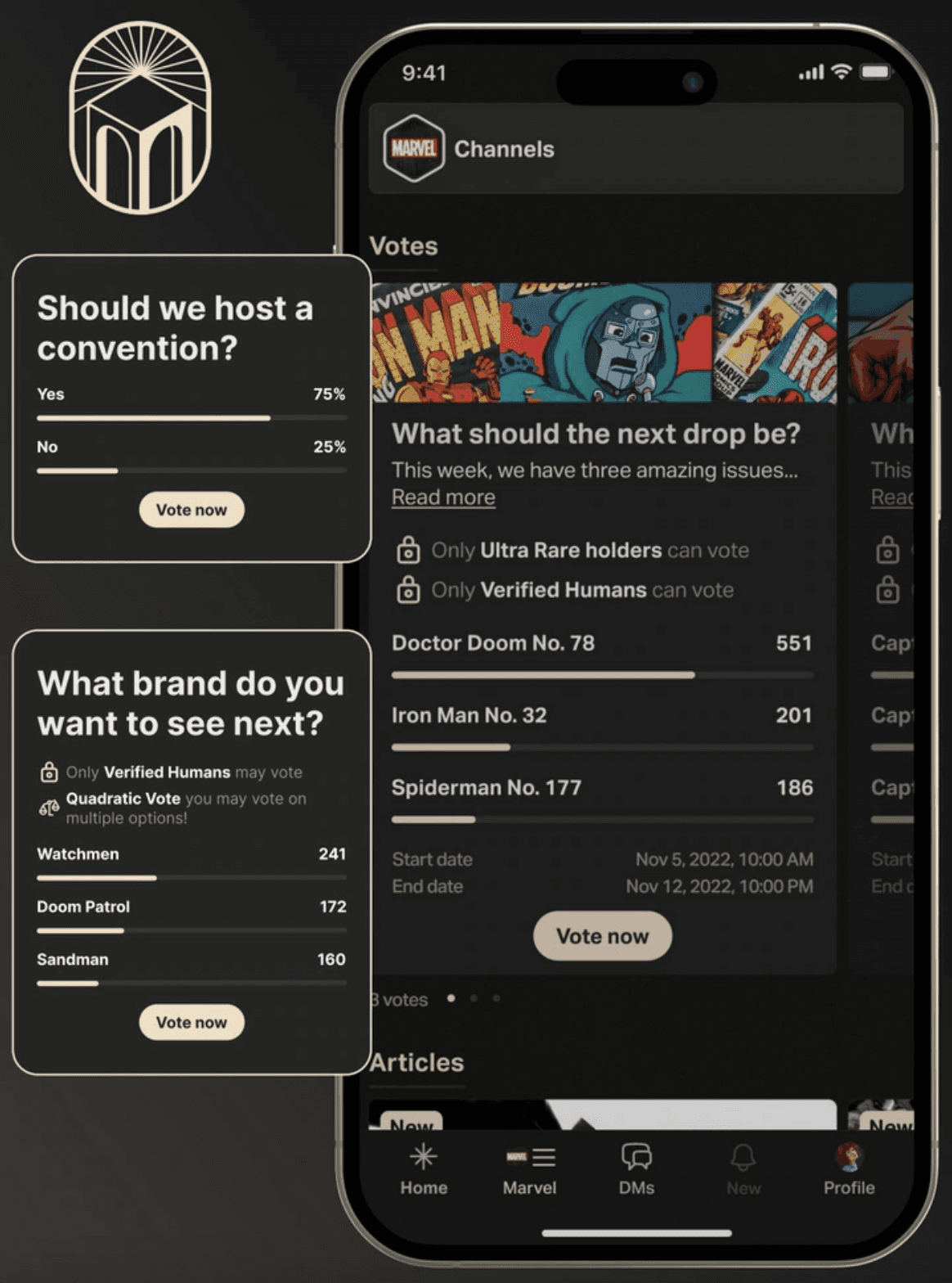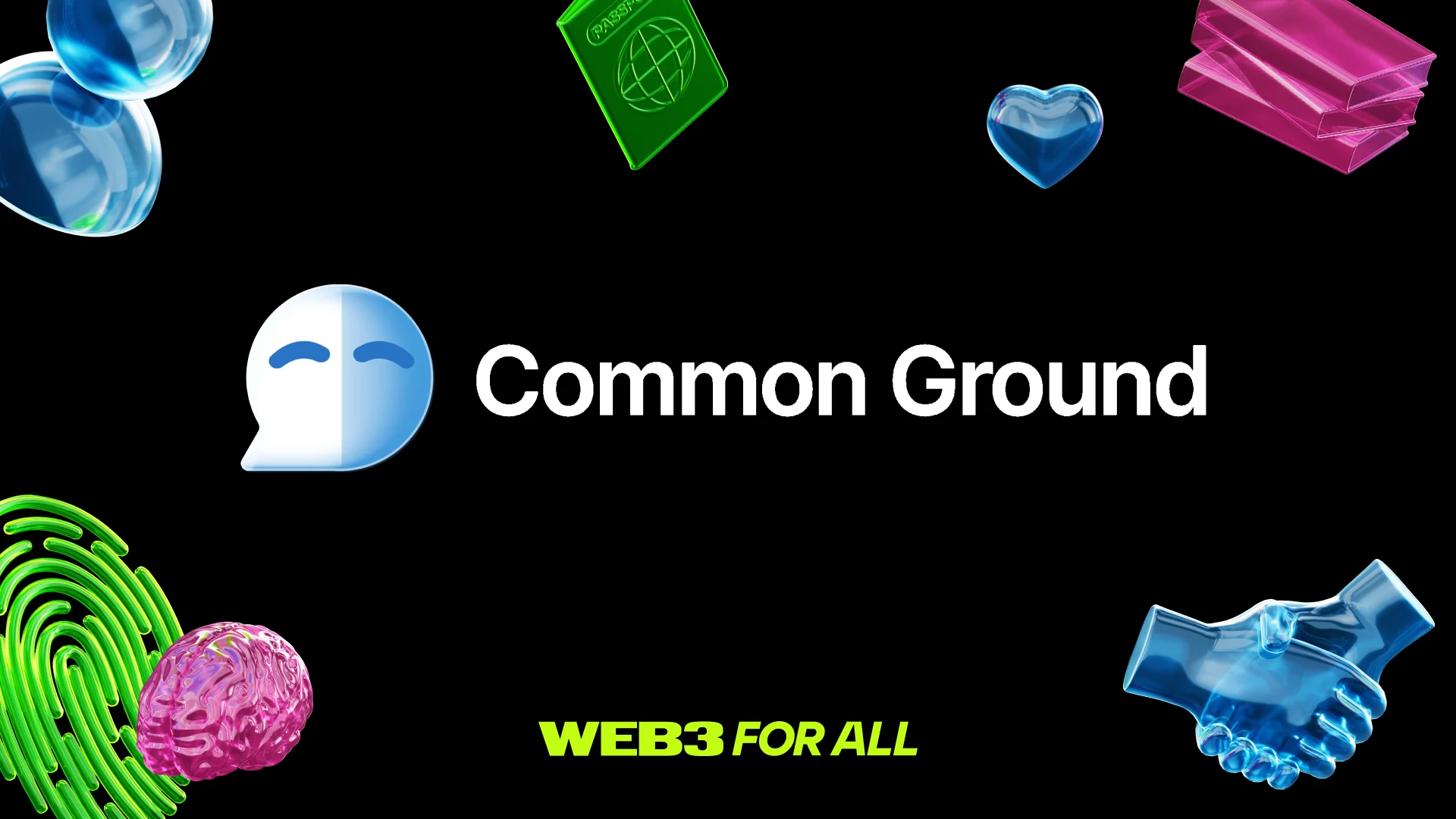Our Roadmap for Q2 2023
Our Roadmap for Q2 2023
We've been asked by some of our communities what the next few months will bring to the Common Ground platform in terms of new features and usability improvements. As promised, here is the rundown.

Florian Glatz
Published on March 20, 2023
March 20, 2023

TL;DR
Until end of June you can expect the following features & improvements:
an improved UX & UI
signup via email or metamask for new users
verify you're a human without connecting a wallet first
customizable roles & permissions for communities
community governance (voting)
video & audio spaces, including screen sharing
mobile push notifications & email digests
native mobile apps on Android & iOS
community newsletters Now I'll explain some items from this list in more detail:
UI & UX Rework, User Journeys
Whenever we demo Common Ground to new users, communities or investors, they are blown away by the beautiful interface and sophisticated user experience design. We're proud to be leading the way in what web3 interactions are going to look like. For too long has the aspect of "how it looks and feels" been ignored by builders and projects in the space.
However, we've also learned in the past few months where our interface falls short. Despite our best efforts, Common Ground can still at times be too complicated to use by average users. That's why we're currently streamlining and simplifying UI and UX across the board.
We also improve the user journeys for first-time users. So they better understand how to get the most out of Common Ground. We're confident that in its next iteration, the platform will appeal to even more users.
Roles & Permissions
Today, communities on Common Ground can give a number of pre-defined roles to team members, i.e. Mod, Editor and Admin. There are special permissions attached to these roles, such as moderating chats, posting articles and changing the community as a whole.
Example from the Common Ground community.
In addition to these pre-defined roles, communities can also use gating rules to create special access permissions to community spaces. In particular, areas can be human-gated and/or token-gated. In case of token-gating, communities can require users to present a connected wallet with certain tokens in it, to gain access. In case of human-gating, communities can require users to present a proof-of-personhood to allow access to a space.
Example from the Common Ground community
These features give communities a lot of room for customization and the ability to create intimate, digital experiences.
Yet, many communities today don't have a token they can use for access-gating spaces. Moreover, many users don't have wallets or know how wallets work, not to mention the complications of acquiring a community's token.
Hence, we've embarked on designing and implementing a full-blown customizable role-based access control system (RBAC), that allows communities to define as many roles as they like, with custom access permissions attached to them, regardless of tokens.
In fact, when the new system is live, every user on Common Ground will have a number roles in each community that they decide to join. As users get more deeply involved in a given community, they can unlock more roles that are tied to access into different spaces within that community. This way, communities can create an immersive experience for their members, without having to rely on an understanding of tokens. At the same time, tokenized communities have more options in designing roles tied to tokens. Both worlds can happily co-exist on Common Ground, making it a unified home for web2 and web3 communities. Yay 🥳
Community Governance
Collective decision-making is going to be a key driver of communities in the future. We want to accelerate this transition by offering best-in-class governance features for communities. We'll start small but over time, governance will become a major feature on Common Ground. Our first stab at this will be simple polls, that communities can create to gather the opinion of their users on the things that matter.
Here's a little sneak peak:

An example of polls in community dedicated to digital collectibles.
Video & Audio Spaces
First Clubhouse, then Twitter Spaces have been a runaway success - and for good reason. The ability to connect speakers and audiences in real-time conversations is a powerful feature. But neither Clubhouse nor Twitter are made for communities. That's why we believe we can offer a unique experience here on Common Ground, for communities to have open or gated conversations, talks, webinars, streams, concerts, conferences, and whatever else you can think of.
We're extremely excited about this feature and are looking forward to see what you're going to come up with.
Native Apps & Push Notifications
Today, Common Ground works well on mobile phones, tablets, laptops and desktop computers. Through the magic of "progressive web apps", anyone can install Common Ground as a "native app" on their devices.
However, today there is no way to get notified about new messages you've received in your communities, or in your personal inbox. That makes it super hard to stay up to date with ease.
In addition to that, many users still don't know about the magic of progressive web apps and how to install them on their phone's home screen. Apple and Google have successfully bred a generation of internet users that prefer to download binaries from their walled gardens than readable HTML from the open web. Now, we can either decry this state of affairs or we can go to where the users are and try to educate them over time. We decided to choose the latter path. Hence, we're going to publish native apps in the App & Play Store, to allow users to install Common Ground as a "native app" on their phones.
The added benefit of this path, is that we can finally solve the notification problem. Whenever you receive a new message, reaction or other kind of notification on Common Ground, you'll see it instantly on your home screen.
We're excited about this and think it will make it much easier to stay updated on what's happening on Common Ground.
Community Newsletters
Newsletters have become a popular tool for retaining and growing users over the past couple of years. People love informative, digestible updates in their inbox. When it comes to communities, there are no dedicated tools today that allow for the same functionality. Instead, platforms like Substack cater to individual creators only. But what if there is a whole community that you want to stay up to date with?
Common Ground will allow communities to offer newsletter subscriptions in the near future. We believe this will become a popular and powerful feature for communities to keep their members informed on what's happening.
Anything missing?
Which features or improvements are you missing on this list? Let us know anywhere within the Common Ground community. We're actively taking user feedback into account!
TL;DR
Until end of June you can expect the following features & improvements:
an improved UX & UI
signup via email or metamask for new users
verify you're a human without connecting a wallet first
customizable roles & permissions for communities
community governance (voting)
video & audio spaces, including screen sharing
mobile push notifications & email digests
native mobile apps on Android & iOS
community newsletters Now I'll explain some items from this list in more detail:
UI & UX Rework, User Journeys
Whenever we demo Common Ground to new users, communities or investors, they are blown away by the beautiful interface and sophisticated user experience design. We're proud to be leading the way in what web3 interactions are going to look like. For too long has the aspect of "how it looks and feels" been ignored by builders and projects in the space.
However, we've also learned in the past few months where our interface falls short. Despite our best efforts, Common Ground can still at times be too complicated to use by average users. That's why we're currently streamlining and simplifying UI and UX across the board.
We also improve the user journeys for first-time users. So they better understand how to get the most out of Common Ground. We're confident that in its next iteration, the platform will appeal to even more users.
Roles & Permissions
Today, communities on Common Ground can give a number of pre-defined roles to team members, i.e. Mod, Editor and Admin. There are special permissions attached to these roles, such as moderating chats, posting articles and changing the community as a whole.
Example from the Common Ground community.
In addition to these pre-defined roles, communities can also use gating rules to create special access permissions to community spaces. In particular, areas can be human-gated and/or token-gated. In case of token-gating, communities can require users to present a connected wallet with certain tokens in it, to gain access. In case of human-gating, communities can require users to present a proof-of-personhood to allow access to a space.
Example from the Common Ground community
These features give communities a lot of room for customization and the ability to create intimate, digital experiences.
Yet, many communities today don't have a token they can use for access-gating spaces. Moreover, many users don't have wallets or know how wallets work, not to mention the complications of acquiring a community's token.
Hence, we've embarked on designing and implementing a full-blown customizable role-based access control system (RBAC), that allows communities to define as many roles as they like, with custom access permissions attached to them, regardless of tokens.
In fact, when the new system is live, every user on Common Ground will have a number roles in each community that they decide to join. As users get more deeply involved in a given community, they can unlock more roles that are tied to access into different spaces within that community. This way, communities can create an immersive experience for their members, without having to rely on an understanding of tokens. At the same time, tokenized communities have more options in designing roles tied to tokens. Both worlds can happily co-exist on Common Ground, making it a unified home for web2 and web3 communities. Yay 🥳
Community Governance
Collective decision-making is going to be a key driver of communities in the future. We want to accelerate this transition by offering best-in-class governance features for communities. We'll start small but over time, governance will become a major feature on Common Ground. Our first stab at this will be simple polls, that communities can create to gather the opinion of their users on the things that matter.
Here's a little sneak peak:

An example of polls in community dedicated to digital collectibles.
Video & Audio Spaces
First Clubhouse, then Twitter Spaces have been a runaway success - and for good reason. The ability to connect speakers and audiences in real-time conversations is a powerful feature. But neither Clubhouse nor Twitter are made for communities. That's why we believe we can offer a unique experience here on Common Ground, for communities to have open or gated conversations, talks, webinars, streams, concerts, conferences, and whatever else you can think of.
We're extremely excited about this feature and are looking forward to see what you're going to come up with.
Native Apps & Push Notifications
Today, Common Ground works well on mobile phones, tablets, laptops and desktop computers. Through the magic of "progressive web apps", anyone can install Common Ground as a "native app" on their devices.
However, today there is no way to get notified about new messages you've received in your communities, or in your personal inbox. That makes it super hard to stay up to date with ease.
In addition to that, many users still don't know about the magic of progressive web apps and how to install them on their phone's home screen. Apple and Google have successfully bred a generation of internet users that prefer to download binaries from their walled gardens than readable HTML from the open web. Now, we can either decry this state of affairs or we can go to where the users are and try to educate them over time. We decided to choose the latter path. Hence, we're going to publish native apps in the App & Play Store, to allow users to install Common Ground as a "native app" on their phones.
The added benefit of this path, is that we can finally solve the notification problem. Whenever you receive a new message, reaction or other kind of notification on Common Ground, you'll see it instantly on your home screen.
We're excited about this and think it will make it much easier to stay updated on what's happening on Common Ground.
Community Newsletters
Newsletters have become a popular tool for retaining and growing users over the past couple of years. People love informative, digestible updates in their inbox. When it comes to communities, there are no dedicated tools today that allow for the same functionality. Instead, platforms like Substack cater to individual creators only. But what if there is a whole community that you want to stay up to date with?
Common Ground will allow communities to offer newsletter subscriptions in the near future. We believe this will become a popular and powerful feature for communities to keep their members informed on what's happening.
Anything missing?
Which features or improvements are you missing on this list? Let us know anywhere within the Common Ground community. We're actively taking user feedback into account!
TL;DR
Until end of June you can expect the following features & improvements:
an improved UX & UI
signup via email or metamask for new users
verify you're a human without connecting a wallet first
customizable roles & permissions for communities
community governance (voting)
video & audio spaces, including screen sharing
mobile push notifications & email digests
native mobile apps on Android & iOS
community newsletters Now I'll explain some items from this list in more detail:
UI & UX Rework, User Journeys
Whenever we demo Common Ground to new users, communities or investors, they are blown away by the beautiful interface and sophisticated user experience design. We're proud to be leading the way in what web3 interactions are going to look like. For too long has the aspect of "how it looks and feels" been ignored by builders and projects in the space.
However, we've also learned in the past few months where our interface falls short. Despite our best efforts, Common Ground can still at times be too complicated to use by average users. That's why we're currently streamlining and simplifying UI and UX across the board.
We also improve the user journeys for first-time users. So they better understand how to get the most out of Common Ground. We're confident that in its next iteration, the platform will appeal to even more users.
Roles & Permissions
Today, communities on Common Ground can give a number of pre-defined roles to team members, i.e. Mod, Editor and Admin. There are special permissions attached to these roles, such as moderating chats, posting articles and changing the community as a whole.
Example from the Common Ground community.
In addition to these pre-defined roles, communities can also use gating rules to create special access permissions to community spaces. In particular, areas can be human-gated and/or token-gated. In case of token-gating, communities can require users to present a connected wallet with certain tokens in it, to gain access. In case of human-gating, communities can require users to present a proof-of-personhood to allow access to a space.
Example from the Common Ground community
These features give communities a lot of room for customization and the ability to create intimate, digital experiences.
Yet, many communities today don't have a token they can use for access-gating spaces. Moreover, many users don't have wallets or know how wallets work, not to mention the complications of acquiring a community's token.
Hence, we've embarked on designing and implementing a full-blown customizable role-based access control system (RBAC), that allows communities to define as many roles as they like, with custom access permissions attached to them, regardless of tokens.
In fact, when the new system is live, every user on Common Ground will have a number roles in each community that they decide to join. As users get more deeply involved in a given community, they can unlock more roles that are tied to access into different spaces within that community. This way, communities can create an immersive experience for their members, without having to rely on an understanding of tokens. At the same time, tokenized communities have more options in designing roles tied to tokens. Both worlds can happily co-exist on Common Ground, making it a unified home for web2 and web3 communities. Yay 🥳
Community Governance
Collective decision-making is going to be a key driver of communities in the future. We want to accelerate this transition by offering best-in-class governance features for communities. We'll start small but over time, governance will become a major feature on Common Ground. Our first stab at this will be simple polls, that communities can create to gather the opinion of their users on the things that matter.
Here's a little sneak peak:

An example of polls in community dedicated to digital collectibles.
Video & Audio Spaces
First Clubhouse, then Twitter Spaces have been a runaway success - and for good reason. The ability to connect speakers and audiences in real-time conversations is a powerful feature. But neither Clubhouse nor Twitter are made for communities. That's why we believe we can offer a unique experience here on Common Ground, for communities to have open or gated conversations, talks, webinars, streams, concerts, conferences, and whatever else you can think of.
We're extremely excited about this feature and are looking forward to see what you're going to come up with.
Native Apps & Push Notifications
Today, Common Ground works well on mobile phones, tablets, laptops and desktop computers. Through the magic of "progressive web apps", anyone can install Common Ground as a "native app" on their devices.
However, today there is no way to get notified about new messages you've received in your communities, or in your personal inbox. That makes it super hard to stay up to date with ease.
In addition to that, many users still don't know about the magic of progressive web apps and how to install them on their phone's home screen. Apple and Google have successfully bred a generation of internet users that prefer to download binaries from their walled gardens than readable HTML from the open web. Now, we can either decry this state of affairs or we can go to where the users are and try to educate them over time. We decided to choose the latter path. Hence, we're going to publish native apps in the App & Play Store, to allow users to install Common Ground as a "native app" on their phones.
The added benefit of this path, is that we can finally solve the notification problem. Whenever you receive a new message, reaction or other kind of notification on Common Ground, you'll see it instantly on your home screen.
We're excited about this and think it will make it much easier to stay updated on what's happening on Common Ground.
Community Newsletters
Newsletters have become a popular tool for retaining and growing users over the past couple of years. People love informative, digestible updates in their inbox. When it comes to communities, there are no dedicated tools today that allow for the same functionality. Instead, platforms like Substack cater to individual creators only. But what if there is a whole community that you want to stay up to date with?
Common Ground will allow communities to offer newsletter subscriptions in the near future. We believe this will become a popular and powerful feature for communities to keep their members informed on what's happening.
Anything missing?
Which features or improvements are you missing on this list? Let us know anywhere within the Common Ground community. We're actively taking user feedback into account!
Read more articles



Web3 for All
Consensys, the company behind Metamask, Infura, Linea and other significant projects in web3, features Common Ground prominently on their blog.

·
Oct 2, 2024



The App Revolution: what's hot in web3 right now?
After years of intense focus on infrastructure and protocols, the spotlight is finally shifting to applications. In this blog post, we'll dive deep into Web3 applications, exploring how they're reshaping various aspects of our digital lives.

Florian Glatz ·
Sep 26, 2024



Ecosystems as Groups of Groups: a new primitive in large-scale coordination?
Web3 more than any other sector of the economy explicitely designs, develops and evolves the idea of ecosystems. For the first time, a group of researchers in web3 has analyzed the ecosystem phenomenon as an emerging group of groups primitive.

·
Sep 5, 2024
Menu
Menu
